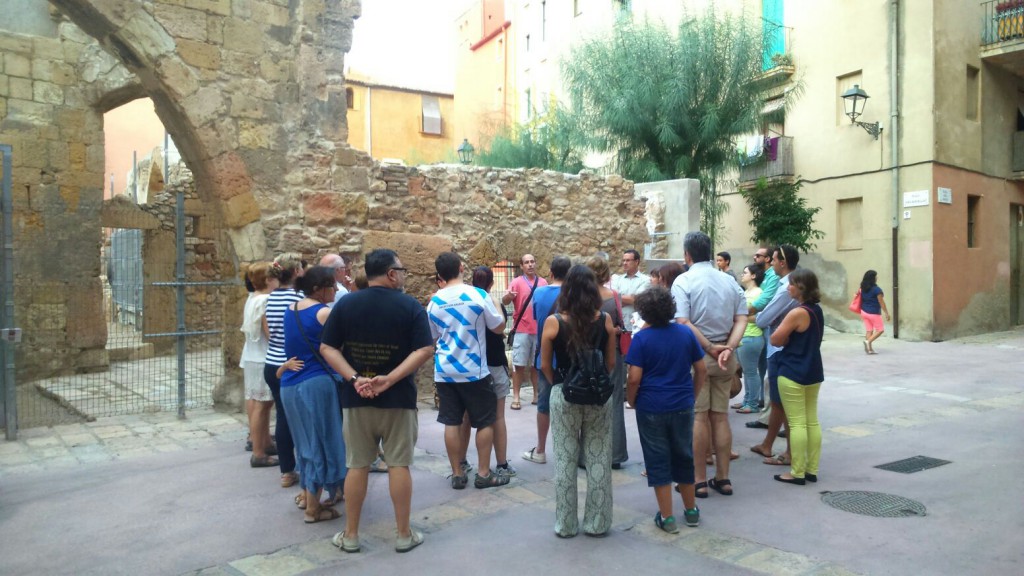18/04/2016
IBER sets sights on bringing ancient cuisine to the public and promoting specialised tours
IBER, the URV spin-off, will offer guided and dramatized tours of the Jewish quarter and other important areas of the medieval city. The aim is for these two tours to become a regular part of the city’s cultural calendar. Furthermore, the members of IBER, who are all researchers at the URV, have applied their knowledge of history and archaeology to the production of a craft beer using the brewing techniques of the ancient Iberians, with the aim of bringing ancient cuisine to the general public

IBER, the URV spin-off, will offer guided and dramatized tours of the Jewish quarter and other important areas of the medieval city. The aim is for these two tours to become a regular part of the city’s cultural calendar. Furthermore, the members of IBER, who are all researchers at the URV, have applied their knowledge of history and archaeology to the production of a craft beer using the brewing techniques of the ancient Iberians, with the aim of bringing ancient cuisine to the general public
IBER will offer guided tours of medieval Tarragona starting on 14 May and repeating them every third Saturday of the month. This is the way in which the URV spin-off company aims to promote the city’s heritage in 2016. The tour will take in the main sights of the medieval city located in Tarragona’s old town, for example, the medieval wall, the king’s castle, the Jewish quarter, the gothic houses and the Cathedral Square. The tour will also feature Pili Cugat playing the part of the ‘Jew of Tortosa’, who at various points will offer Jewish and sacred songs.
In addition to this, IBER aims to make guided visits to Tarragona’s Jewish quarter a permanent fixture on the city’s cultural calendar. It is a place that IBER’s researcher know well, having excavated and documented it thoroughly. According to David Bea, the company’s general manager, this area of the city “is completely overlooked by tourists interested in the history of Tarragona, whose visits focus almost entirely on the legacy of the Romans”. At the end of the tour, visitors will also have the opportunity to sample Catalan-Jewish cuisine.
The researchers at IBER are also preparing tours of the city’s new town, its port and its modernist architecture in order to explain their importance during the 19th century.
Ancient cuisine
In September, IBER unveiled a new beer called Ibèrika. It is a craft beer inspired by the ingredients and production techniques used by the Iberians. The product will go on sale in April and has been developed with the sole purpose of promoting ancient culture and cuisine among the general public.
The beer is based on the analysis of residues found in pottery by URV researchers at various Iberian archaeological sites. After two years of research they have found, among other things, that the Iberians flavoured their beer with mugwort rather than hops, which were not introduced until the Middle Ages.
IBER’s researchers are currently engaged in collecting data and carrying out tests to develop a second beer based on techniques used in ancient Mesopotamia and Egypt that involve a form of bread called bappir that was made from dates and fermented.
These products are a new line of business for the company, which will use them principally during its workshops and tours to explain ancient Iberian culture and cuisine. The aim for the future is to produce other products such as wine, honey and garum and non-gastronomic products such as jewellery.
Excellent and innovative tourism
One of the principal characteristics of IBER is that its researchers have a profound knowledge of their discipline thanks to the years of research that they have conducted in this area and on these periods of history. In addition to their regular activities, they also offer options that are tailor-made to meet the needs of all types of visitor, such as family groups or people attending international conferences.
The company IBER is dedicated to archaeology, heritage and tourism and is a URV spin-off that emerged from an initiative by the GRESEPIA research group (Seminar on Protohistory and Archaeology). It was founded in 2013 and since then its researchers have worked hard to acquire new knowledge regarding the world of business and the tourism sector. But above all, they have dedicated themselves to disseminating the excavations that they have carried out at Tortosa, Tarragona and Salou and have created a tourist attraction based on an innovative format and excellent content. To help the business get off the ground, IBER has been assisted by consultants from the URV’s Unit of Valorisation and Commercialisation with the support of ACCIÓN.
During 2015, IBER gave its tours to more than 1000 people from a range of backgrounds. The aim for the future is to keep growing and in 2016 they have already doubled their turnover from last year.
More information: www.iberapt.com
More news about: arqueology, IBER Arqueologia Patrimoni i Turisme, tourism
